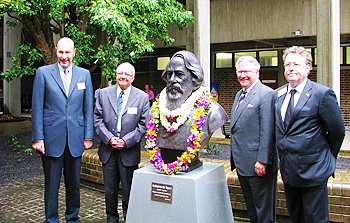Sydney, May 8: Rabindra Nath Tagore (1861-1941) – the great Indian poet, philosopher, musician, writer, and educationist, born on May 7, 1861 corresponds to 25th of Vaisakh month in the Bengali calendar of 1268.
‘Pocheeshe Boishakh’ is a very special cultural festival for Bengalis, celebrated as Rabindra Jayanti – birth anniversary of Gurudev Rabindra Nath Thakur.
Australia’s Macquarie University campus proudly boasts of a Nobel Laureate Rabindranath Tagore bust installed in 2011 – on his 150th birth anniversary; marked with a presentation and garlanding of the bust of the famous Indian poet, novelist, musician and playwright.
Indian Consul-General, Mr Amit Dasgupta presented the bust on behalf of the government of India to Macquarie Chancellor, Hon. Michael Egan and Vice-Chancellor Professor Steven Schwartz.
Named the Bengali Spice Garden, a special area of the Macquarie Uni campus in the W6A courtyard, was specially earmarked to host the bust. Featuring plants from the Indian subcontinent, it was created to enhance and celebrate the centrepiece – the bust of the world renowned composer. 
Circa 2016 – Tagore’s 155th birth annoversary, the garden has now attained luxuriant and flourishing maturity and representing Tagore’s unique and unparallel writing and compositions.
He is the only writer who holds the distinction as ‘composer of the national anthem’ for two countries – India’s Jana Gana Mana and Bangladesh’s Amar Shonar Bangla.
No wonder then that, a garden launch and celebration, hosted by Macquarie University’s Deputy Vice-Chancellor (Academic) Professor John Simons, was joined by the Macquarie University Bangladesh Student Association and Indian Student Committee Macquarie.
Tagore has been a cultural icon with his various literary works along with his unique set of musical notes – the RabindraSangeet – both lyrics and composition by himself.
He was a poet who bridged that gap between the eastern and the western world – his writings and compositions identified at all spheres. He was awarded the Nobel Prize in Literature in 1913 for his ‘Gitanjali’ in 1910.
Born in 1861, to a wealthy Brahmin family of Calcutta, Tagore never liked or finished formal schooling. Later when he was sent to England for formal schooling, he ended up not finishing his studies there.
Yet he went to become the great educationist, thinker, reformist and writer with an unparallel wisdom – which mesmerize art lovers, even today.
Tagore helped reshape Bengali literature, music and poetry in the late 19th and early 20th centuries.
Such was his endowment to the cultural scene that today an Australian University celebrates the rich, cultural and literary tradition of Bengalis and Indians. The special ceremony was held on 27 April, attended Mr B Vanlalvawna, Consul General of India to Sydney and Mr Sandip Hor, Bengali Association of NSW.
Macquarie University has worked with the Confederation of Indian Industry’s India@75 Mission, to focus on joint development and to invest in the educational and cross cultural development of Indian students along with Joint Industry Research.
Macquarie’s scholarship support of Indian students now totals more than AUD$11 million.
Nidhi Mehta

